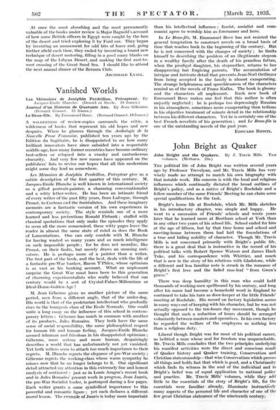John Bright as Quaker
THE political life of John Bright was written several years ago by Professor Trevelyan, and Mr. Travis Mills has very wisely made no attempt to match his own biography with that notable work. His concern is with the local and religious influences which continually dictated the broad outlines of Bright's policy, and as a native of Bright's Rochdale and a fellow member of the same Friends' Meeting he can claim some special qualifications for the task.
Bright's home life at Rochdale, which Mr. Mills sketches in his introductory chapter, was simple and happy. He went to a succession of Friends' schools and wrote years later that he learned more at Bootham school at York than in any other two years of his school life. School ended for him at the age of fifteen, but by that time home and school and meeting-house between them had laid the foundations of a true and biding nobility of character. Though Mr. Travis Mills is not concerned primarily with Bright's public life, there is a great deal that is instructive in the record of his political talks with Robert Spence Watson and James Hack Tukc, and his correspondence with Whittier, and much that is new in the story of his relations with Gladstone, while a different and less familiar note is struck in the romance of Bright's first love and the faded rose-leaf " from Gwen's grave."
There was deep humility in this man who could hold thousands of working-men spellbound by his oratory, and long after his name had become a household word in England he continued to take his turn as door-keeper at the little Friends' meeting at Rochdale. His record on factory legislation seems in many ways out of keeping with his character, but he was not actually opposed to the ten-hours day movement, though he thought that such a reduCtion of hours should be arranged voluntarily between masters and operatives. In his own factory he regarded the welfare of the employees as nothing less than a religious duty.
Liberal though Bright was for most of his political career, as befitted a man whose zeal for freedom was unquenchable, Mr. Travis Mills concludes that the two principles underlying his manifest activities were the direct and conscious result of Quaker history and Quaker training,- Conservatism and Christian statesmanship—that wise Conservatism which proves all things and holds fast that which is good, and a Christianity which finds its witness in the soul of the individual and in Bright's- belief was of equal application to national policy and practice. Mr. Travis Mills' volumes, while they add little to the essentials of the story of Bright's life, for the essentials were familiar already, illuminate instructively many aspects of the personal life and character of one of the few great Christian statesmen of the nineteenth century.




























































 Previous page
Previous page